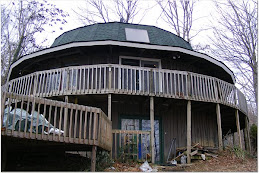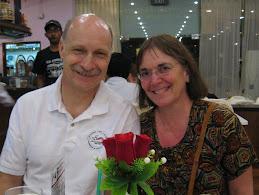Having come this far and resolving my immediate crisis, I now have the time to actively worry about how this will affect my children.
A mother who has had breast cancer now impacts their lives in a way that no mother would ever want. Though it's no fault of my own, I still feel guilty that I have passed along a curse that will hang over their lives. They are now both at increased statistical risk for developing reproductive organ cancers during their lifetimes, but they could also be denied future health or life insurance, just based on my history.
Juli has an appointment at the University of Washington next week, for a risk-assessment workup. She has no health insurance (nor does Alex, for that matter), but Bill & I think it is imperative that we try to protect her from whatever impact my disease will have on her life. If she is indeed at higher risk, there is a possibility that she might be able to become part of a study to track young women with a similar profile, and her ongoing care might be paid for. If not, we will pay for it, and do it gladly. It almost feels like a penance.
We have been told that young women don't get breast cancer, or if they do, it is extremely rare. But the evidence is mounting that this just isn't true anymore. The research shows that the fastest-growing group of breast cancer patients is in women between 30-40. One could argue that better detection methods are responsible for this demographic, but the fact is that mammogram screening doesn't work in women under 40--their tissues are too dense to see anything. Ultrasounds and MRIs can sometimes detect problems in young women's breasts that mammography cannot. But they are expensive, and not practical as a wide-net screening tool. Perhaps Juli can be more closely monitored as part of a study, or perhaps there are other things they can do to help her.
Then there's the gene research. The horrifying statistic is that 90% of women with the BRCA1 or BRCA2 genetic mutation will develop breast cancer, and many of those women are in their 20s. Those gene mutations kick in at puberty, and a decade later, these women end up with aggressive, mostly metastatic tumors when they are in their 20s. The numbers of them are no longer rare, they are increasing. And if you have the mutation, does that mean that you have a pre-existing condition that no insurance will cover? There's another terror.
Men get breast cancer too. This is extremely rare (about 1600 cases per year in the U.S.), but Alex is now assumed to be at double the normal risk for developing prostate cancer, simply because I had breast cancer. Where the lifetime risk for women getting breast cancer is currently 1 in 8 (or 1 in 7 in some studies), men in general have a 1 in 4 chance of getting prostate cancer.
The research money for breast cancer has increased exponentially over the last decade, thanks to the incredible fund-raising efforts of organizations such as the Susan G. Komen Foundation and the corporate sponsorships flouting pink ribbons on everything from M&Ms to yogurt. Not so for prostate cancer, which affects twice as many men. Anyone who doubts the power of women roused by anger and spurred to community action should look at that discrepancy. When you have men holding nationwide "Walks for the Cure" and sporting logo pins (I'm thinking of several possibilities for an eye-catching symbol here), then maybe you'll see some increase on that funding. So far, most of the research money for men goes towards curing ED, not reproductive cancer. How's that for irony? But we women have sons (and fathers and husbands), and shouldn't we be advocating for them as well? If all these increasing number of women who have had breast cancer have now passed this legacy on to their sons, I suspect that this is the next population that will start showing leaping increases in cancer rates.
The kicker is that all the medical community can offer us is early and earlier detection methods--no one is talking about what is causing it. I read an article the other day about cancer prevention ("30 Cancer-Proofing Tips!") and snorted in disgust. Everyone thinks they know a little piece of the puzzle (diet, exercise, environmental toxins, etc.), but right now it's all just a Vegas dice game of chance and probability.
No one really knows what is causing it, and more disturbingly, no one on the treatment side of medicine is posing the question. Maybe it's just because I've spent the last 4 months talking to the "after" guys (the doctors you see after you've already got the disease). But for my children, I want them seeing people who are looking at the "before" side of the equation.
I was born in 1953, the year that Jonas Salk developed his polio vaccine. I have to think that there are researchers out there, working their guts out, trying to find the answer. I pray they find it in time to spare all our children.
Subscribe to:
Post Comments (Atom)





No comments:
Post a Comment